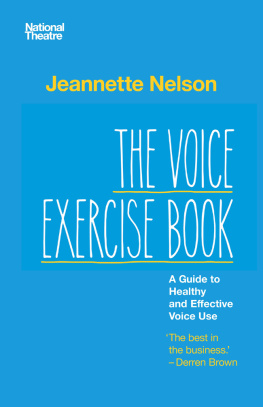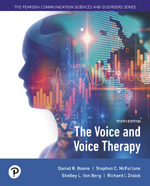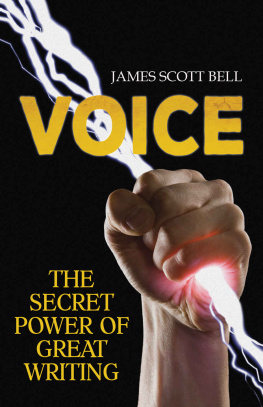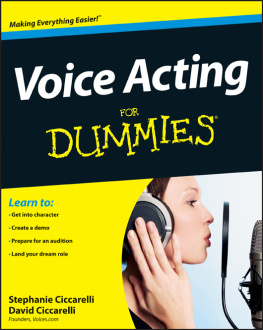Jeannette Nelson
The Voice
Exercise Book
A Guide to Healthy
and Effective Voice Use

PUBLISHED BY
NATIONAL THEATRE PUBLISHING
The Royal National Theatre,
South Bank, London SE1 9PX
www.nationaltheatre.org.uk
DISTRIBUTED BY
NICK HERN BOOKS
The Glasshouse,
49a Goldhawk Road, London W12 8QP
www.nickhernbooks.co.uk
This ebook first published in 2017
First published 2015
Text copyright Jeannette Nelson 2015 except Foreword Nicholas Hytner
The right of Jeannette Nelson to be identified as author of this work has been asserted by her in accordance with the Copyright, Designs and Patents Act 1988
All rights reserved. No part of this book may be reproduced, stored in a retrieval system, or transmitted in any form or by any means, electronic or mechanical, including photocopying and recording, without permission in writing from National Theatre Publishing.
The author is not a health practitioner and does not purport to give medical advice. If a reader is in any doubt as to whether to adopt any recommendation made in this book on account of an existing medical condition or health concern, they should seek advice from a health practitioner.
A catalogue record for this book is available from the British Library
Design and illustrations by Tal Brosh
ISBN 978 1 84842 654 2 (paperback edition)
ISBN 978 1 78001 856 0 (ebook edition)
CAUTION - This ebook is copyright material and must not be copied, reproduced, transferred, distributed, leased, licensed or publicly performed or used in any way except as specifically permitted in writing by the publishers, as allowed under the terms and conditions under which it was purchased or as strictly permitted by applicable copyright law. Any unauthorised distribution or use of this text may be a direct infringement of the authors and publishers rights, and those responsible may be liable in law accordingly.
To my teachers, David Carey and Patsy Rodenberg
Watch Jeannette Nelson coaching
on iTunes U and YouTube
A series of free online videos from the National Theatre are available to complement the material in this book. These videos are available on YouTube (www.youtube.com/ntdiscovertheatre) and iTunes U (https://itun.es/i6Bv9gt#iTunes). Each short film has a different area of focus: a vocal warm-up; a demonstration of how an actor engages the voice to fill different theatrical spaces (using the three stages in the National Theatre); and a series of exercises with texts that Jeannette would typically use in rehearsals, with a particular emphasis on Shakespeare.
Contents
Preface
I feel extremely lucky to have written this book while working at the National Theatre. In this wonderful institution there are many unseen and unsung heroes. Some of these dedicated and busy people found time to help me.
Alice King-Farlow said yes to the book in the first place, and Katie Town provided early support and encouragement. Kathryn Marten, Emma Gosden, Paula Hamilton and Kate Godfrey, my dear colleague in the voice department, all read the manuscript and gave advice. Ollie Winser provided the art direction and Kate Bone published the book.
However, some of the most important contributors to the book are from outside the National Theatre. Matthew Mills cast his expert eye over the scientific and medical elements. The delightful illustrations and design are the work of Tal Brosh, using Tondi Mpambawashe as her model for the male drawings. Finally, Kathryn Perry was my brilliant, patient and understanding editor, who really made the book what it is.
My grateful thanks to you all.
Foreword
Everyone knows that actors need to be comprehensible, and everyone knows that they need to be truthful. All actors know how much of a challenge it is to be both.
Jeannette Nelson is at the heart of the National Theatres rehearsal process. She gives actors the confidence to embrace the vast auditorium of the Olivier Theatre, and she knows how to make them believe that through the exercise of their imaginations and the relentless exercise of their craft they can hit the back wall at the same time as they exchange the most delicate intimacies with their fellow actors.
Jeannette seems to me to be absolutely devoted to the idea that you cant be real on stage without letting the audience in. If you arent skilled enough to communicate what youre saying, thinking and feeling, you are by definition untruthful, because truth in the theatre doesnt exist in a vacuum. If the audience doesnt know whats going on, nothings going on. And nothing is neither truthful nor untruthful its nothing.
Through Jeannettes work, and through the craft that she teaches, actors learn that technique and truth are bedfellows, and that vocal projection isnt just a matter of speaking loud enough; its the consequence of a fully engaged imagination.
She and I have worked together countless times on Shakespeares plays, and Ive learned an enormous amount from her. We agree that its possible to speak Shakespeares lines as if they are the spontaneous consequence of a real thought process, and that you can do this without compromising how extraordinary they are.
Every year, actors at the National become better actors because theyve worked with Jeannette. This book shows why.
Nicholas Hytner
London 2015
This book is designed for anyone who wants to use their voice more effectively. It is designed to be a simple and straightforward guide to good voice production, beginning with an explanation of how the voice works and followed by exercises to establish a reliable vocal technique.
I have developed this work over the many years I have been working as a theatre voice coach at Britains National Theatre, the Royal Shakespeare Company and at Shakespeares Globe. I have used, and continue to use, these exercises to train and keep in shape the voices of all types of actors. I take the same approach with experienced and well-known actors as I do with those at the beginning of their careers.
I also use the work with people who are not in the theatre. We can all improve the performance of our voice with knowledge of how it works and by practising simple exercises.
In you can find out more about how I apply the work at the National Theatre.
Who is this book for?
This book is for actors, teachers and anyone else who uses their voice professionally. That might be all day or just at meetings and presentations, or in the theatre. Its content is based on the work I do every day with professional actors and is therefore suitable for anyone who has to perform with their voice, whether on stage, in school, in a place of worship, in the boardroom, on the sales floor or on the end of a telephone. Being heard and understood, clearly and easily, is of course the desire of all who use their voice to communicate professionally.
You may already have a strong reason for choosing this book. Perhaps you have experienced some difficulties when using your voice professionally or have been advised that improving your verbal communication skills will advance your career. Maybe you have to speak for extended periods or have to use enough volume to fill a big space and command an audience. Or you may need your voice to show confidence and authority when speaking at meetings, selling your products or dealing with the public.











